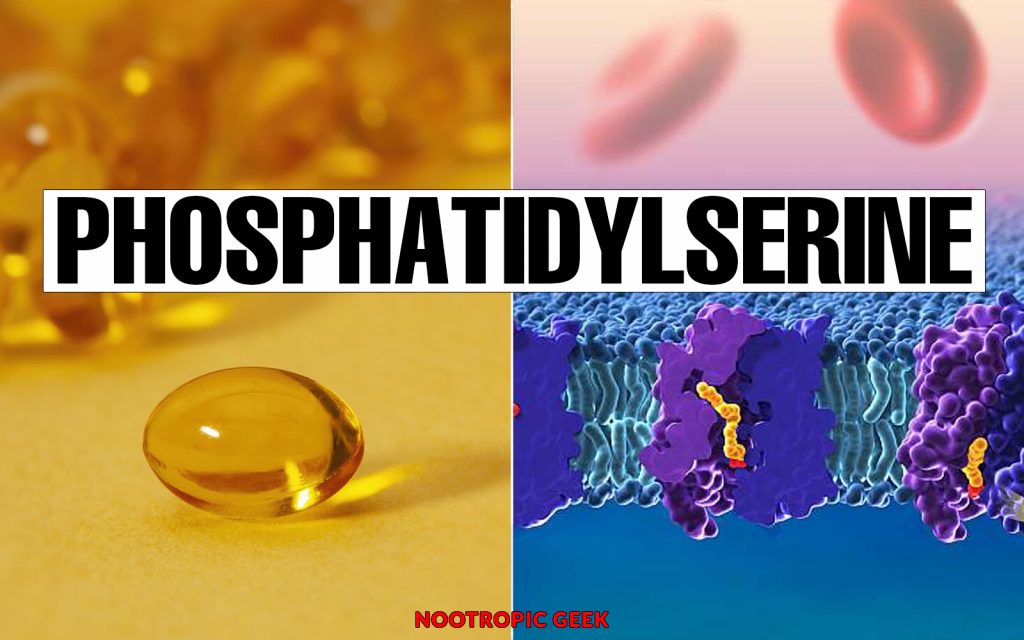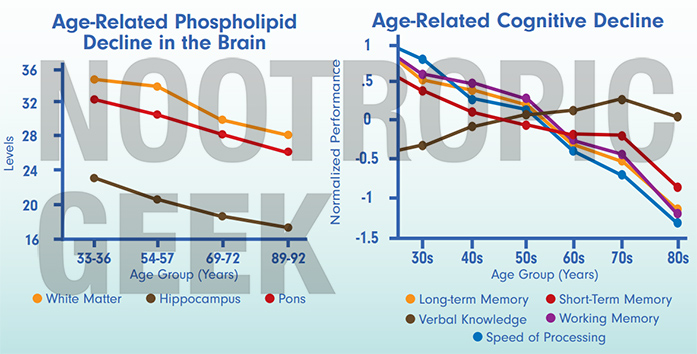Summary: Phosphatidylserine Review
Do you have trouble remembering details? Always “drawing a blank”? Dealing with dull focus and muddy moods? Natural Phosphatidylserine (PS) might slow and even reverse these, and other, symptoms of age-related cognitive decline. Some researchers have suggested that PS “turns back the clock,” making the brain functionally 12 years younger. PS also shows nootropic potential as a mental performance enhancer in younger populations
Brain cell membranes do a lot more than you think. And in this review, I discuss one of the best nootropics for optimizing brain cell membrane health and performance: Phosphatidylserine (PS).
PS is a natural substance found in brain cell membranes that is important for cognitive performance and neurogenesis, but undergoes a steady natural decline as we grow older. Restoring healthy PS levels in the brain may help to enhance cognitive performance, improve memory retention, promote healthy mood, slow cognitive aging and decline, and even possibly interfere with the progression of dementia.
For its many roles in long-term and short-term brain health and function, I consider PS among the “must-have” nootropic in any brain-boosting regimen.
Page Contents
How Phosphatidylserine is Supposed to Work
First off, how do you even pronounce phosphatidylserine? Say out loud: the pronunciation is “Fahs-fuh-tie-dill-SER-een.”
Now say it 10 times fast.
Some spell it “phosphatidylserine”, but you’ll occasionally see it spelled as two words, “phosphatidyl serine.”
Let’s make it easy and just call it “PS.”
PS is an orthomolecule that already exists in almost every cell in your body. The body (and brain) may recognize PS as a natural, beneficial substance, since it is already present. This is part of why PS is so well-tolerated, safe, and (mostly) side effect free in supplement use.
While Phosphatidylserine (PS) is found in all cells, it is most highly concentrated in the brain.
In particular, PS is concentrated in brain cell membranes. As a sort of coating for neurons, PS helps with the transfer of information from one brain cell to the next. This neurotransmission drives all aspects of cognitive function.
PS also helps to keep brain cell membranes fluid and permeable; this flexibility is associated with sharp cognitive performance and long-range brain health.
Where does Phosphatidylserine come from?
Early PS supplements were derived from animal brains (yuck!). The next incarnation of PS supplements were sourced from soybeans. Today, soy-based PS supplements are still super-popular, but some companies are turning to alternate PS sources — such as sunflower — as soy seems to be losing popularity.
- The Geek is no soy boy, so I avoid soy products entirely. No interest in cow brains either, so these days I am taking sunflower-sourced PS supplements exclusively.
The Problem: PS Declines with Age.
PS is part of the brain-boosting phospholipid class, known to decline notably with age in a path that mirrors age-related cognitive decline.
Since phospholipids like PS make up a large part of the brain’s structure, as the brain loses them over time, brain cells — especially brain cell membranes — may undergo changes and not work as well.
- Without phospholipids, the brain may become abnormal and the nervous system may misfire: Low levels of brain phospholipids like PS have been linked to the onset of age-related brain degeneration.
BUT, the good news is you can restore youthful phospholipid levels in the brain by taking PS supplements, especially the Good Stuff.
Related:
Best Nootropics for Memory
This is one reason why I think any nootropic stack MUST include Phosphatidylserine — you want to replenish it and maintain it for age-related mental sharpness.
It doesn’t hurt that PS is probably one of the top 5 most researched nootropics, and it just might be the most evidence-backed nootropic for memory… but more on that later.
PS seems super important, and concentrated in the brain for many good reasons — because PS performs many beneficial bioactivities for brain health and cognitive function.
PS’s brain-boosting activities include:
Structural support for brain cells
Phosphatidylserine helps support brain cell membranes in a number of different ways: It helps “glue” brain cell membranes together, keeps them fluid and flexible, orchestrates neurotransmitters and receptors, and boosts the nerve growth factor (NGF) that contributes to plasticity. PS is also a raw material used in creating fresh new brain cells. When we don’t have enough PS in our brain cell membranes, cognitive decline seems to set in.
Cell-to-cell communication support
PS lives in brain cell membranes, where it acts as a “coordinator” for the storage, release, and activity of several key brain chemicals and their respective receptors; including brain chemicals for memory, mood and new learning. PS is believed to play a role in the production of the brain’s neurotransmitters.
In particular, one animal study found that PS seemed to restore production of acetylcholine in geriatric rats. This may be significant because acetylcholine contributes to memory, concentration, and long-range brain health.
Phosphatidylserine may also signal for dopamine release (linked to motivation and mind-body coordination).
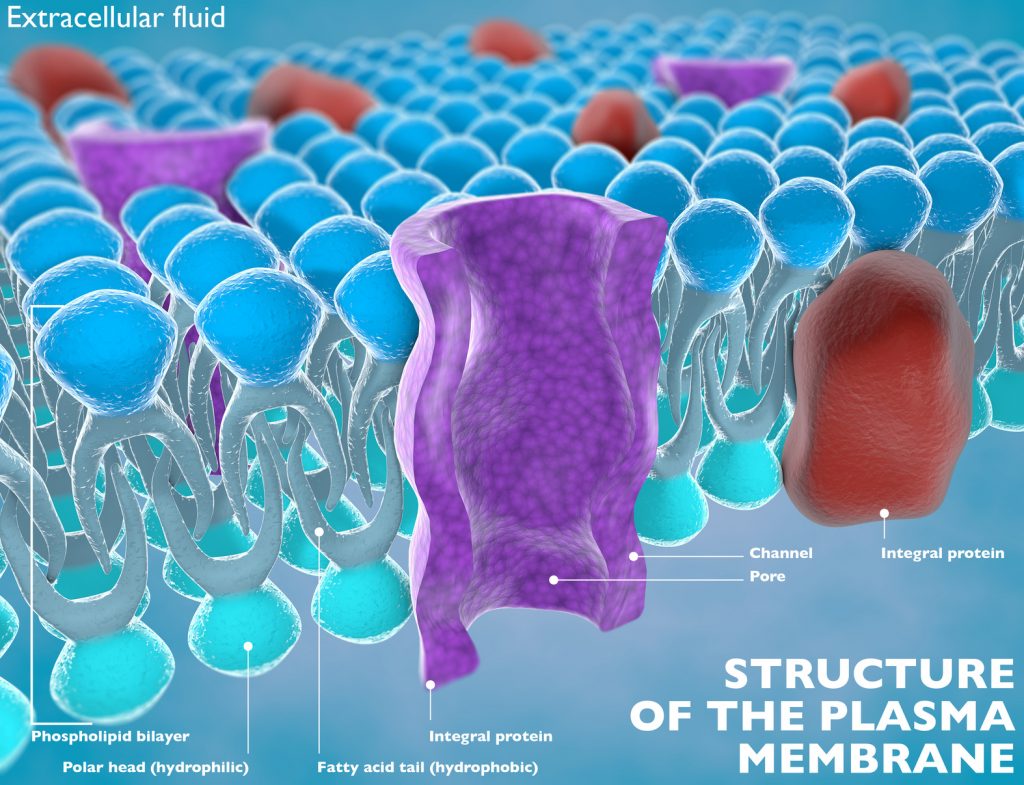
Brain energy metabolism
PS appears to play a role in the brain glucose metabolism, which is the “power supply” that fuels all cognition and may help energize mental performance. One small, early study found 500 mg of PS for 3 weeks appeared to boost global metabolic rate by 14.7% and glucose metabolism by about 20% in the basal ganglia and visual cortex parts of the brain.
Anti-stress effects
Research on younger adults has found that 300 mg of PS daily for a month seems to be associated with less stress and a better overall mood.
Another study on older adults found that a high dose of 800 mg PS daily significantly blunted stress hormone spikes that usually occur with physical exercise.
- This apparent brain-beneficial bioactivity led researchers to suggest that PS might help to counter stress-induced activation of the endocrine system’s HPA axis.
Brain “detoxification”
When brain cells shut down, they become toxic. PS sends out a chemical signal that alerts the immune system to collect and dispose of the degrading brain cells before they turn toxic – saving neighboring cells from toxicity damage.
Phosphatidylserine Nootropic Benefits
Supplement marketers say phospholipids like PS, in optimizing brain cell membrane structure and performance, can unleash whole-brain benefits for memory, mood, concentration, and learning. It is also marketed as a brain supplement for degenerative concerns like Alzheimer’s (though responsible marketers will never use that particular word).
If you ask me, PS is most evidence backed for helping with age-related memory decline, especially when brain degeneration is already present. I tend to agree with the expansive claims of some supplement manufacturers, just because PS is so great for brain cell membranes, and those same membranes coordinate all kinds of thinking.
The FDA’s Grumpy Admission on PS
The evidence supporting PS is so overwhelming that even the United States FDA – which is known for its legendary toughness against dietary supplements – has grudgingly approved a health claim for PS, part of which states
Consumption of phosphatidylserine may reduce the risk of dementia and cognitive dysfunction in the elderly. Very limited and preliminary scientific research suggests that phosphatidylserine may reduce the risk of dementia and cognitive dysfunction in the elderly. FDA concludes that there is little scientific evidence supporting these claims.”
*Note, supplement makers are only allowed to make this claim if their product supplies 300 mg of PS per serving. Still, it is impressive that the FDA allows claims on PS helping with dementia and cognitive decline; it is the only nootropic claim I know of to ever have received the FDA nod of approval (begrudging as it may be).
Researchers have Suggested that Phosphatidylserine Might:
Be a potential therapy for age-related cognitive decline
One study tracked 51 people aged 55-75 as they took PS over 12 weeks. When the study concluded, researchers discovered that patients who took phosphatidylserine 300 make daily. Significant and in memory, including daily detail, every every week, remembering names, and finding misplaced items. Researchers suggested the cognitive improvements by position PS as a therapy for age-related cognitive impairment.
Improve memory function in elderly Japanese subjects
In this study, a soybean-derived PS brand called Soy-PS was administered in 100 mg or 300 mg dosages daily (or placebo) to a study pool of 78 elderly adults between the ages of 50 and 60 who were diagnosed with mild cognitive impairment. Researchers found that in those subjects who scored low on memory and cognition tests, the PS supplement brought significant improvements in test performance. Researchers suggested soy-based PS supplements might improve memory function in elderly people with memory issues, and pointed out that the 100 mg PS dosage was just as effective as the 300 mg dosage.

Improve memory and learning in cases of age-related brain fog
In this study, 149 subjects with diagnosed age associated memory impairment between the ages of 50 and 75 took either 100 mg PS every day or a placebo pill for 12 weeks. At the end of the study, researchers reported that when compared to the placebo group, the patients who took phosphatidylserine seemed to score better on cognitive testing related to memory and learning.
Enhance multiple cognitive performance measures in elderly people
This study is much bigger, involving 494 elderly people who had been diagnosed with moderate to severe brain degeneration. This study pool was administered PS at a 300 mg dosage or placebo pill every day for a span of six months. Researchers concluded the study by noting that phosphatidylserine was an important discovery, because it appeared to bring significant enhancements in several measures of mental performance, including memory, motivation, mood, and learning ability.
Be helpful for children with ADD/ADHD
I find this next study to be especially exciting. Phosphatidylserine is usually pigeonholed as an elderly cognitive performance supplement. But in this trial, PS supplements were given to 36 children aged 4 to 14, who had previously been diagnosed with attention disorders. Taken at a 200 mg dosage every day for two months, the phosphatidylserine supplement was suggested by researchers to bring significant enhancements to attention performance, impulse control, and memory.
PS: Unbridled Researcher Enthusiasm
These researchers get so excited about PS, it’s hard not to get excited right along with them:
Exogenous PS (300-800 mg/d) is absorbed efficiently in humans, crosses the blood-brain barrier, and safely slows, halts, or reverses biochemical alterations and structural deterioration in nerve cells. It supports human cognitive functions, including the formation of short-term memory, the consolidation of long-term memory, the ability to create new memories, the ability to retrieve memories, the ability to learn and recall information, the ability to focus attention and concentrate, the ability to reason and solve problems, language skills, and ability to communicate. It also supports… rapid reactions and reflexes.”
While I don’t necessarily agree with everything they say, the researchers’ laundry list of phosphatidylserine benefits seems to validate its role as a multi-tasking nootropic that can help cognition in many ways.
My Experience with Phosphatidylserine
I take PS every single day. In my overflowing supplement cabinet, I’ve got 7+ products — including PS softgels, capsules and stacks — that supply phosphatidyl serine.
What can I say? I am The Nootropic Geek. I buy many nootropics. Imma big believer in PS.
I will be the first to admit, though: PS is mostly for older people, age 55+.
One of the most awesome things about PS that is backed by so many human research trials. But when you take a close look at them, you will see that the best ones – and there are quite a few – seem to benefit elderly and geriatric populations, many of whom are already in cognitive decline or have Alzheimer’s.
This doesn’t bother me. You see, it’s the bioactivities of phosphatidylserine that compel me to take it every day.
PS seems to do so many positive things for both structure and function of gray matter – and its critical role in brain cell membrane performance, especially, suggests that it can help with many different aspects of thinking.
Since I have never taken PS as a solo nootropic (only in stacks and complex supplements), I can’t really link phosphatidylserine to any one obvious tangible brainpower benefit. Taking nootropic stacks have definitely helped my memory, but I can’t isolate PS as the exact reason why.
But of all PS’s purported benefits, I will say that memory performance enhancement is the biggest, best, and most evidence backed.
Short-term memory, long-term memory, learning, storage, recall, any kind of memory you can think of, phosphatidylserine is probably good for it.
Also, because of its role in the creation of new brain cells and brain plasticity, I made phosphatidylserine a key nootropic for my concussion recovery stack.
I would definitely take it again if I were in those circumstances again – it is just too good for neuroregeneration to pass up.
Here are a few examples of products from my supplement cabinet that supply Phosphatidyl serine:



Best Nootropic Supplements with Phosphatidylserine
As a standalone supplement, PS seems to work best in its cleaner, non-soy, sunflower-derived format. One of the most popular brands for this is Sharp-PS®. However, to get the most out of any premium, high quality PS, you’ll want to stack it with other premium, high quality nootropics, such as:
Mind Lab Pro
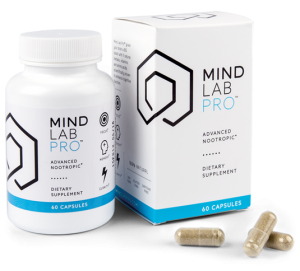 Everything in Mind Lab Pro contributes towards enhanced cognition and brainpower in its own way. With citicoline (as Cognizin®), Mind Lab Pro amplifies brain energy and synaptic plasticity. With Bacopa (9 bio-active constituents), Mind Lab Pro enhances the brain’s acetylcholine status, and with PS (as Sharp-PS® Green) Mind Lab Pro improves short- and long-term memory, cognitive clarity and longevity. (And this describes only three of Mind Lab Pro’s 11 ingredients.)
Everything in Mind Lab Pro contributes towards enhanced cognition and brainpower in its own way. With citicoline (as Cognizin®), Mind Lab Pro amplifies brain energy and synaptic plasticity. With Bacopa (9 bio-active constituents), Mind Lab Pro enhances the brain’s acetylcholine status, and with PS (as Sharp-PS® Green) Mind Lab Pro improves short- and long-term memory, cognitive clarity and longevity. (And this describes only three of Mind Lab Pro’s 11 ingredients.)
As I mentioned before: PS is mostly for older people aged 55+ — and thus I’m not quite in my “elderly prime” to enjoy the full benefits of PS. Which is why I’m particularly fond of Mind Lab Pro’s comprehensive cognitive enhancing design, which allows me to satisfy my self-imposed PS requirement while also consuming other noticeable, fast-acting nootropics. With that in mind, Mind Lab Pro’s PS seems to work for both young and old.
Want some? Get the Best Deal on Mind Lab Pro here.
Read my in-depth review on Mind Lab Pro.
Performance Lab Mind
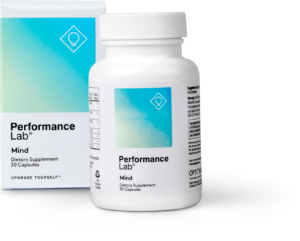 Performance Lab Mind supplies the same PS quality and quantity as Mind Lab Pro (100 mg Sharp-PS®) in addition to three other ingredients shared by Mind Lab Pro: citicoline (as Cognizin®), L-Tyrosine, and Maritime Pine Bark Extract. As such, Performance Lab Mind operates as a shorter, simplified version of Mind Lab Pro, delivering powerful long- and short-term brain boosts that may be better stacked with other nootropic supplements.
Performance Lab Mind supplies the same PS quality and quantity as Mind Lab Pro (100 mg Sharp-PS®) in addition to three other ingredients shared by Mind Lab Pro: citicoline (as Cognizin®), L-Tyrosine, and Maritime Pine Bark Extract. As such, Performance Lab Mind operates as a shorter, simplified version of Mind Lab Pro, delivering powerful long- and short-term brain boosts that may be better stacked with other nootropic supplements.
Again, users young and old may get a kick out of Performance Lab Mind — enjoying its more immediate brain boosts via, say, N-Acetyl L-Tyrosine, while receiving a daily dose of PS for long-term cognition. And as the name suggests: Performance Lab Mind is for mental performance enhancement, supplying all the mental and physical performance benefits of PS — and then some.
Want some? Get the Best Deal on Performance Lab Mind here.
Read my in-depth review on Performance Lab Mind.
Is Phosphatidylserine a Good Nootropic?
Absolutely. This is where things get really intriguing with phosphatidylserine. It is well-established as a brain health nutrient for older adults. But, emerging research seems to position phosphatidylserine as much more of a “brain-booster” – a mental performance oriented nootropic that can help in the short term, as well.
Recent research on PS helping with attention performance in children seems to back this assertion. It is also been studied for its potential in sports applications, including golf, where it may help to promote the laser-sharp focus that is needed (for me) to break 100 on the links.
So, there is a lot percolating with phosphatidyl serine – I say buy it as a long-term mental performance play, and if you happen to enjoy the mental performance benefits along the way, well, that’s just brain gravy. Delicious brain gravy.
Overall, phosphatidylserine is a multi-tasking nootropic with great evidence for memory and great potential for whole brain health, including attention, focus, concentration, and more. This is one nootropic that should form the core of any and all brain nutrition regimens.
Read my BIG List of Nootropics
Overall Phosphatidylserine Nootropic Power Rating
[yasr_multiset setid=0]

